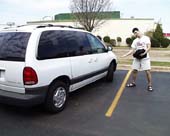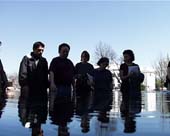 |
|||
|
home february 26 february 27 february 28 february 29 march 1 march 2 march 3 march 4 march 5 reflections bios |
s.p.l.c. in the a.m., rest in the p.m. by alyssa picard picarda@umich.edu The problem with budget accommodations is that you never know when the Klan will move in next door. That's what happened today while Natalie, Teresa and I were at the Montgomery International Airport renting a car. By the time I found out about it, we were all sitting down for alligator at Gator's Plaza Restaurant, a Cajun place with an excellent, if risqué, blues band recording live tonight. Actually, it's not totally clear that the guys downstairs are, in fact, the Klan. But this weekend is the 35th anniversary of the Bloody Sunday march across the Edmund Pettus bridge, and these guys were carrying armloads of Confederate flags and some suspicious-looking white satin robes, so you do the math. I am not blind to the danger that the Klan poses to each of us here in Alabama. At the Southern Poverty Law Center today, we had to go through a metal detector to enter the building. At the end of our tour, when the group moved to leave, I split off to go to the ladies' room. By the time I rejoined the group, our guide had radioed the security desk to let them know that someone had disappeared and was wandering around the building unescorted. She told us that Klan members come in full regalia to stand by the Maya Lin civil rights memorial outside the building. Sometime in the 1980s, Klan members trying to destroy evidence of their activities firebombed the SPLC's offices. Tough luck for the Klan: the SPLC keeps its files in fireproof containers. More important to me as a teacher is the challenge the presence of the Klan poses to the philosophy of love and nonviolence our students seem to have embraced. If we believe in the power of nonviolent persuasion, how come we're not downstairs helping the Klansmen understand the varieties of logical fallacy? Martin Luther King, Jr. wrote: The nonviolent resister never lets this idea go, that there is something within human nature that can respond to goodness. So that a Jesus of Nazareth or a Mohandas Gandhi, can appeal to human beings and appeal to that element of goodness within them, and a Hitler can appeal to the element of evil within them. But we must never forget that there is something within human nature that can respond to goodness, that man is not totally depraved; to put it in theological terms, the image of God is never totally gone. ("Love, Law and Civil Disobedience," November 16, 1961) King taught the power of agape, which "is a love in which the individual seeks not his own good, but the good of his neighbor. Agape does not begin by discriminating between worthy and unworthy people, or any qualities people possess…It is an entirely 'neighbor-regarding concern for others,' which discovers the neighbor in every man it meets." ("An Experiment in Love," 1958) When I read things like this, I'm amazed that King ever got his own national holiday, because his religious philosophy was and remains opposed to US foreign and domestic policy, and indeed to secularity itself, on nearly every level. He was a radical, and his message has grown no less radical with time. But more importantly, I wonder if our students have found, or will find, some way to reconcile their admiration for King's philosophy of love with their visceral hatred of the Klan. If they have, I wish they would share it with us. |
 Jeb can't park, as evidenced by this photograph.  Joe speaking infront of Dexter Avenue Baptist Church, where the Montgomery Bus Boycott was orchestrated.  The sign outside the Southern Poverty Law Center in Montgomery, Alabama.  We sat and spoke with a representative of the SPLC inside their high-security building. Here we are in the lobby.  Part of the Civil Rights Memorial at the SPLC. The memorial was designed by Maya Lin, the artist who designed the Vietnam Memorial in Washington, D.C.  A wider view of the entire memorial.  Joe, looking at the rear wall of the memorial. It paraphrases Martin Luther King, Jr. and the Book of Amos. "Until Justice Rolls Down Like Water, Justice Like a Mighty Stream." Water flows over the entire memorial.  The group standing around the memorial.  The rear wall of the memorial.  A group photo at the memorial that one of the SPLC's many security officers was kind enough to take for us. |
|
Opinions expressed on this website do not necessarily reflect the views of the University of Michigan or any of its schools or colleges.